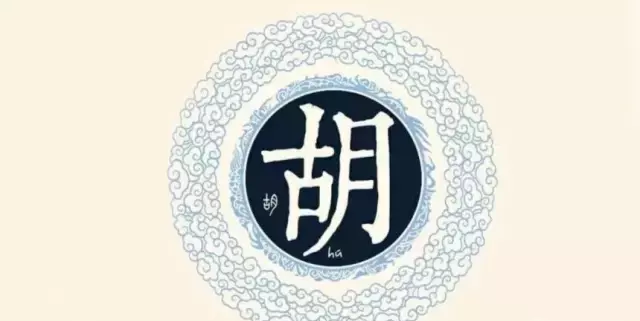The surname Hu is a common surname today, ranking 158th in the "Hundred Family Names".
In 2007, the national surname population ranked 13th, widely distributed, accounting for about 1.31% of the national Han population, one of the nineteen major surnames with more than 1% of the Chinese population.

The origin of the surname
1. From the surname of concubine, with the name of the person
In the early years of the Western Zhou Dynasty, Emperor Shun's descendant Hu Gongman was enfeoffed with the State of Chen, and at the end of the Spring and Autumn Period, he was destroyed by the State of Chu, and some of his descendants took Hu as their clan.
According to historical records such as the Yuan He Surname Usurpation, the origin of Hu's surname can be traced back to the descendants of the concubine surname of the ancient saint Yu Shun. In this way, the ancestor of his Hu surname should be Hu Gongman, who was crowned chen di by King Wu of Zhou more than three thousand years ago.
Hu Gongman was the thirty-third grandson of Yu Shun, the son-in-law of King Wu of Zhou, and was given the title of Marquis of Chen. It can be seen that the ancestors of the Chinese Hu clan were the descendants of the orthodox Yu Shun, the descendants of the Yellow Emperor.
2. From Ji, gui surname, with the name of the country
(1) One is the State of Hu with the surname Ji, in the east of Luohe City, Henan Province, which was a vassal state of the same surname in the Zhou Dynasty that was divided into the early Western Zhou Dynasty.
It participated in a coalition led by the State of Chu to attack the State of Wu, and later followed the State of Chu in its battle against the State of Wu, which annexed the State of Beard on its way back to the division.
(2) One is the surname Hu Guo, in Fuyang, Anhui Province. He was destroyed by the Chu state during the reign of Duke Ding of Lu.
At the end of the Spring and Autumn Period, these two Hu states were successively destroyed by the State of Chu, and the descendants of their monarchs all took Hu as their surname, and the people of the country all took Hu as their surname, called Hu, forming two Branches of Hu, which were passed down from generation to generation.
3. Other ethnic minorities change their surname to Hu.
During the Northern and Southern Dynasties, the Xianbei clan of Northern Wei had the Hu (纥) bone clan, which was changed to a Han surname after entering the Central Plains, called hu. In addition, the Han Dynasty Taiyu Hu Guang, whose original surname was Huang, was later changed to Hu surname, and his descendants took Hu as their surname.
Among the Hu clan, there has been a compound surname of Hu Mu. The compound surname of Hu Mu was derived from the time of King Xuan of Qi, which has a history of more than 2,480 years. The Hu surname was revived and became popular at the beginning. During the Qin Dynasty, there was Taishi Ling Hu Mu Jing, and in the Han Dynasty, there were Hu Mu Sheng and Hu Mu Class.
After the Jin Dynasty, the surname of Hu Mufu was gradually replaced by the single-character surname of "Hu". Because most of his descendants changed their surnames to Hu, the number of Hu mu's surname was gradually decreasing. This is probably one of the reasons why this Hu Mu compound surname is not very common, and it is still rare today.
4. The surname of the Shule people, descendants of the ancient northern Xiongnu.
Among the Hu surnames, in addition to this branch from the descendants of the Yellow Emperor, there are also many foreign people who have changed their surnames to Hu.
After the Han Dynasty, especially at the time of the Wuhu Chaohua, the foreign tribes that entered the Central Plains changed their surnames to the "Hu" clan one after another, adding new elements to the Hu clan of the Han nationality, so that the later reproduction of the Hu surname had another lineage. For example, Hu Chun of the Later Zhou Dynasty was a member of the Shule people, and his descendants were all surnamed Hu.
Migratory distribution
The origin of the Hu clan is, of course, the fiefdom of Chen Guo at the beginning of the Zhou Dynasty. That is, huaiyang county in today's Henan Province.
Since then, the Hu clan has used this as its source, and its descendants have gradually extended everywhere. After several generations of reproduction, it successively reached Xincai in the south and Shanxi in the north, and became a Hu surname Wang clan at that time.
When he arrived in the Han Dynasty, he moved into Shaanxi, Gansu, Shanxi, Shandong, Hubei and other places. Among them, the family that moved to the border of Gansu Province became a major prominent family in the Later Han Dynasty, and later became the main source of Hu clan reproduction in various places.
In the last year of the Western Jin Dynasty, due to the "Yongjia Rebellion", the Hu surname Zhongyuan Shi clan moved south on a large scale, and the Hu surname moved into Fujian. The Hu clan moved south, beginning in the last year of the Western Jin Dynasty.
The descendants of the Hu clan crossed the river from the Central Plains to Anhui first, and then from Anhui to Fujian. Finally, he moved from Fujian to Taiwan. Taiwan's Hu surname has spread throughout the province so far.
However, the more concentrated and largest number of residents are in Tainan, Taipei, Changhua and Hsinchu. Later, the Hu surnames from Xincai and Shanxi moved and multiplied to other places, resulting in all of China.